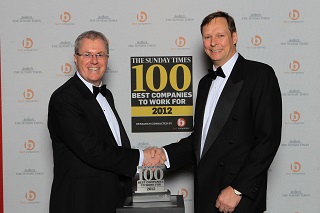Corporations and Sustainability
I’m giving a talk later this month on the subject of multinational corporations and their participation in environmental stewardship and sustainability. I get the distinct impression that the guy who invited me to speak expects this to be uplifting, and, while I’m not anxious to disappoint him, it’s hard not to notice that this is mixed bag.
We should begin by acknowledging that the Fortune 500 employ almost 27 million people, 17% of the total US workforce. We should also note that almost all corporations operating around the globe have made sincere efforts to improve their overall relationship to the world around them; that means better treatment of employees, more attention of abuses that may lie in their supply chains, less pollution, and reduction in the consumption of environmental resources generally.
Yet the outlook isn’t brilliant. In particular, the impact of large corporations on this planet and its people will change. It has to. It’s not sustainable, in the literal sense, i.e., that there are forces that will eventually change its course regardless of shareholders’ desires. Right now, even after decades of efforts on the part of the corporate world to become more eco-focused, we’re still experiencing an exponential growth of resource extraction, consumption, and disposal. (Here’s a wonderful article that speaks to the last of these three.) For example, last year we discarded 300 million tons of plastic, and that figure will most assured continue its rise this year. But there is a limit, somewhere, as to how much we can clog up of our oceans and landfills with waste plastic.
In addition to the physical dilemma associated with environmental impact, there is the moral side to all this. Looking back across the last four years:
In 2012, we had the Libor price fixing scandal, possibly the biggest price-fixing scandal ever affecting upwards of $500 trillion of financial instruments. By the time litigation is through, its estimated 16 banks may face up to $35 billion in civil settlements in addition to other regulatory fines.
2013 brought us the Bangladesh garment factory collapse, in which 1,132 people were killed and 2,500 were injured. Minimum wage for garment workers is $40/month, meaning that the victims were desperately poor people, unprotected by regulation, and ignored by the consumers of the products they make.
2014 Oxfam report included: “85 people (0.00000016% of the world population) own more than the poorest 3.5 billion people on the planet.” This is getting more lopsided each year, and it too is not sustainable, at least in terms of the maintenance of democracy in some nominal sense of the term. The only political context in which this can be maintained is world fascism, and I think we can agree that we don’t want that.
Also in 2014, Freedom Industries allowed to act freely (left alone by the EPA for 20 years) released 7,500 gallons of poison 4-methylcyclohexane methanol into the Elk River.
In 2015, Volkswagen definitely won the prize for brazen criminality for its conspiracy to cheat on emissions tests and sell 11 million vehicles that continue to fill our skies with volumes of nitrogen oxide, a pollutant that can cause emphysema, bronchitis and other respiratory diseases, that far exceed environmental regulations. Researchers who tested the cars honestly found that some of them emitted almost 40 times the permitted levels of nitrogen oxides. That’s a lot of human misery, injected in a population that (previously) trusted VW and the corporate world generally not to behave like that.
Speaking of criminality, albeit a form that’s perhaps not so brazen, you can’t count out ExxonMobil for some sort of prize. As we also learned in 2015, they knew in the early 1980s that their product would eventually cause catastrophic climate change, but conspired to bury the truth and spend a fortune convincing us that climate change is a hoax.
Again, I could go on for days extolling the work that many honest and sincerely concerned corporations are doing to reduce the eco-footprint of their operations, as well as that of the products they sell. Forming a coherent theme to my talk isn’t going to be easy.
I guess my conclusion is simply a prediction: corporations 50 years from now will have a certain characteristic that, in general, they lack today. Maybe it’s all regulatory. There will certainly come a day when the CEO, just he has to attest to the legitimacy of his financial reports today or face criminal prosecution, will have to sign off on extensive environmental reporting and attest that his company’s supply chain is free of child labor, slavery, and unsafe working conditions.
We would be very foolish indeed to think that we had identified all or even most of bad behavior in the corporate world, but let’s assume for the moment that there are relatively few remaining villains. Maybe they’ll make a moral turn-about. I really don’t know, and, as unsatisfactory as that may be to my listeners, I freely admit that it’s true. I like to face an audience with a kind of intellectual humility.
We really don’t know how all this is going to end. Optimists and pessimists are strangely similar in that they both think they know how all this is going to turn out. Optimists think everything will be fine; pessimists think the power of greed is in the process of overpowering the forces of decency. So, let’s ask ourselves: Will this turn out OK? Is there a soft landing for humankind? I like to be candid: I don’t know. And, no offense, but neither do you.
I know people came to get some answers, not a lot of facts that seem to counter one another. Yet I like to finish off with this funny little poem whose point is simply: Don’t ask me. I’ll leave the podium to some level of applause and appreciation, and just be glad that no one threw any over-ripe tomatoes.

